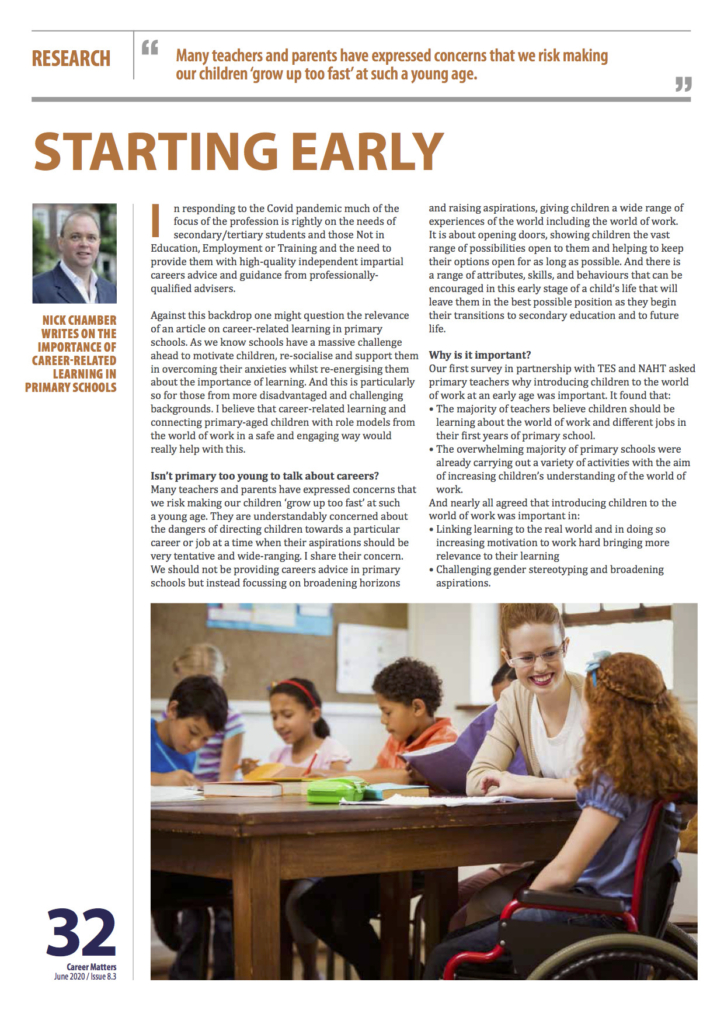This article appeared in the June 2020 edition of CareerMatters, the magazine for the career development sector published by the Career Development Institute.
The importance of career-related learning in primary schools
In responding to the Covid pandemic much of the focus of the careers profession is rightly on the needs of secondary / tertiary students and those Not in Education, Employment or Training and the need to provide them with high quality independent impartial careers advice and guidance from professionally qualified advisors.
Against this backdrop one might question the relevance of an article on career-related in primary schools. As we know schools have a massive challenge ahead to motivate children, re-socialise and support them in overcoming their anxieties whilst re-energising them about the importance of learning. And this is particularly so for those from more disadvantaged and challenging backgrounds. I believe that career-related learning and connecting primary-aged children with role models from the world of work in a safe and engaging way would really help with this.
Isn’t primary too young to talk about careers?
Many teachers and parents have expressed concerns that we risk making our children ‘grow up too fast’ at such a young age. They are understandably concerned about the dangers of directing children towards a particular career or job at a time when their aspirations should be very tentative and wide-ranging. I share their concern. We should not be providing careers advice in primary schools but instead focussing on broadening horizons and raising aspirations, giving children a wide range of experiences of the world including the world of work. It is about opening doors, showing children the vast range of possibilities open to them and helping to keep their options open for as long as possible. And there is a range of attributes, skills, and behaviours that can be encouraged in this early stage of a child’s life that will leave them in the best possible position as they begin their transitions to secondary education and to future life.
Why is it important?
Our first survey in partnership with TES and NAHT asked primary teachers why introducing children to the world of work at an early age was important. It found that:
- The majority of teachers believe children should be learning about the world of work and different jobs in their first years of primary school.
- The overwhelming majority of primary schools were already carrying out a variety of activities with the aim of increasing children’s understanding of the world of work.
And nearly all agreed that introducing children to the world of work was important in:
- Linking learning to the real world and in doing so increasing motivation to work hard bringing more relevance to their learning
- Challenging gender stereotyping and broadening aspirations
Link to attainment
A further study showed that giving children the chance to meet people from the world of work and hearing about their life journeys can help them understand the relevance of subjects they are studying – and in so doing improve motivation and attainment. 90% of teachers thought that pupil achievement can improve as the result of:
- volunteers of the world of work helping pupils to believe in their own abilities and helping them to understand what life is like beyond the classroom
- increased motivation following exposure to role models from the world of work (adults other than teachers) interested in them and their learning
Tackling stereotypes
The reality of gender stereotyping starting at a young age was bought to wide attention by our two-minute film, Redraw the Balance. Viewed over 100 million times it shows 66 children being asked to draw a picture of a surgeon, firefighter and a pilot. 61 of the children drew a picture of a man with only five drawing a woman.
Encouraged by the response to the film we undertook an international survey which asked children aged seven to 11 to draw a picture of the job they want to do when they grow up. Over 13,000 children from the UK took part in the Drawing the Future study and it was clear that from a young age many children had ideas about careers. 36% of children from as young as seven years old, base their career aspirations on people they know. For those who didn’t know anyone who did the job they drew, 45% stated that TV, film, and radio were the biggest factors influencing their choice. Meanwhile, less than 1% of children knew about a job from someone visiting their school. This has huge implications for social mobility, as children from poorer backgrounds may not have access to successful role models from the world of work and their aspirations are limited as a result.
Hallmarks of success
With the NAHT we have devised a series of ‘hallmarks of success’ for career-related learning in primary:
Outcomes:
- Excite and motivate children about their learning by linking and embedding in the curriculum strong connections between education and the world of work
- Broaden children’s horizons and raise aspiration
- Help children see a clear link and purpose between their learning experiences and their future
- Challenge stereotypes that children and their parents often have about jobs and the people who do them
- Support the raising of standards of achievement and attainment for all children
- Help children learn more about their own talents and abilities and instil greater confidence
- Reinforce the importance of numeracy and literacy in later life
- Tailor career-related learning to the different ages and needs of all children
Activities:
- Invite volunteers from the world of work to visit and chat with children
- Deliver career-related learning programmes that help children connect their subject learning to the opportunities now and in the future
- Organise career-related learning trips e.g. to a workplace, museum or university
- Make good use of online learning materials in the classroom such as games, videos, role play, and individual/ group activities
- Explore the diverse routes adults have taken to get their current job e.g. vocational (Inc. apprenticeships), academic, starting their own business etc.
Making it easy
Our charity and the NAHT have been working together over the last 6 years, undertaking research and studying the evidence of the benefits to children of career-related learning. In addition we have been supporting schools who wish to embed it. Many had cited the lack of easy access to volunteers from the world of work so we developed Primary Futures localhost. This uses the Inspiring the Future on-line matchmaking service to give them access to a very wide range of volunteer and resources – all free of charge. More recently we have designed interactive virtual ways to connect schools with volunteers and guidance and materials for this. The feedback from these has been very encouraging and they are now available to schools across the county.
Nick Chambers, CEO Education and Employers Charity
Further information and research reports please see

